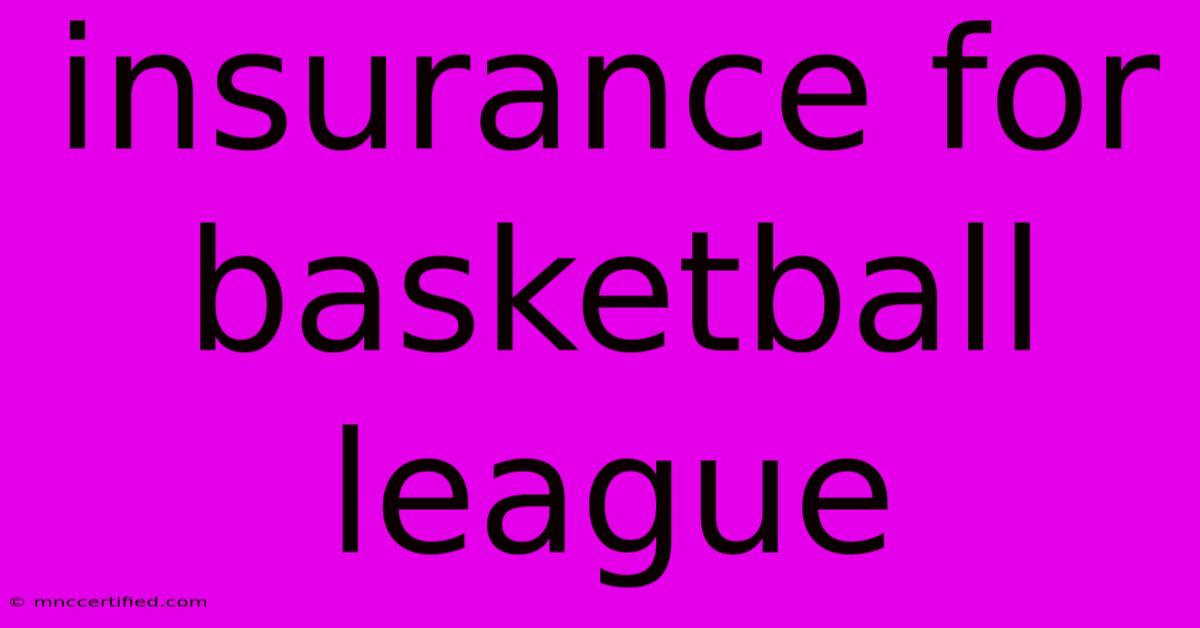Insurance For Basketball League

Table of Contents
Protecting Your Court: A Comprehensive Guide to Insurance for Basketball Leagues
Organizing a successful basketball league requires meticulous planning, from recruiting players and securing venues to managing schedules and finances. However, one crucial aspect often overlooked is insurance. Protecting your league and its members from potential liabilities is paramount. This comprehensive guide will explore the various types of insurance crucial for basketball leagues of all sizes, ensuring a safe and enjoyable experience for everyone involved.
Why is Insurance Essential for a Basketball League?
Accidents happen. A player could suffer a serious injury on the court, a spectator might be hit by a stray ball, or damage could occur to the playing facility. Without adequate insurance coverage, your league could face significant financial repercussions, potentially leading to legal battles and even the league's dissolution. Insurance provides a critical safety net, protecting your organization and its members from unforeseen circumstances.
Key Risks Faced by Basketball Leagues:
- Player Injuries: This is arguably the most significant risk. Injuries ranging from minor sprains to severe fractures can result in substantial medical bills and potential lawsuits.
- Spectator Injuries: A stray ball, a collision with a player, or even a fall in the stands can lead to injuries among spectators. Your league could be held liable for these incidents.
- Property Damage: Damage to the playing facility, equipment, or even personal belongings could occur during games or practices.
- Third-Party Liability: This covers situations where someone outside your league (e.g., a referee, volunteer) is injured on your premises.
Types of Insurance for Basketball Leagues:
Several types of insurance policies can effectively mitigate these risks. Consider the following:
1. General Liability Insurance:
This is the cornerstone of any basketball league's insurance strategy. General liability insurance protects your organization against claims of bodily injury or property damage caused by your league's operations. This is crucial for covering incidents involving players, spectators, or even damage to the playing facility.
2. Accident Medical Insurance:
While general liability covers damages and lawsuits, accident medical insurance directly addresses the medical expenses incurred by injured players or spectators. This can significantly reduce the financial burden on individuals and your league.
3. Directors and Officers Liability Insurance (D&O):
This is particularly important for larger, more formally structured leagues. D&O insurance protects the league's board members and officers from lawsuits related to their decisions and actions.
4. Workers' Compensation Insurance (If Applicable):
If your league employs coaches, referees, or other staff, workers' compensation insurance is a legal requirement in many jurisdictions. This policy covers medical expenses and lost wages for employees injured on the job.
Choosing the Right Insurance Provider:
Selecting the appropriate insurance provider requires careful consideration. Research different companies, compare quotes, and carefully review policy details. Consider these factors:
- Coverage limits: Ensure the policy's coverage limits are sufficient to address potential claims.
- Deductibles: Understand the deductible amount and how it impacts your out-of-pocket expenses.
- Premiums: Compare premiums from different providers to find a balance between cost and coverage.
- Reputation and financial stability: Choose a reputable insurance company with a strong financial standing.
Beyond Insurance: Risk Management Strategies
Insurance is a crucial safety net, but proactive risk management can significantly reduce the likelihood of incidents. Consider these strategies:
- Proper Facility Maintenance: Ensure the playing area is well-maintained and free of hazards.
- Clear Rules and Regulations: Establish clear rules for players and spectators to promote safety and fair play.
- Qualified Officials: Hire experienced and qualified referees to manage games effectively.
- First Aid and Emergency Procedures: Develop and implement a clear plan for handling injuries and emergencies.
By carefully considering your league's specific needs and implementing a comprehensive insurance strategy alongside effective risk management practices, you can ensure a safe and enjoyable basketball experience for all involved. Don't underestimate the importance of insurance – it's a crucial investment in the long-term success and stability of your league.

Thank you for visiting our website wich cover about Insurance For Basketball League. We hope the information provided has been useful to you. Feel free to contact us if you have any questions or need further assistance. See you next time and dont miss to bookmark.
Featured Posts
-
Netflix Doc Jon Benet Ramseys Director
Nov 26, 2024
-
Fetch Vs Lemonade Pet Insurance
Nov 26, 2024
-
Jon Benets Mother Patsy Ramseys Passing
Nov 26, 2024
-
Shelter Insurance Manchester Tn
Nov 26, 2024
-
Harbor And Associates Insurance
Nov 26, 2024